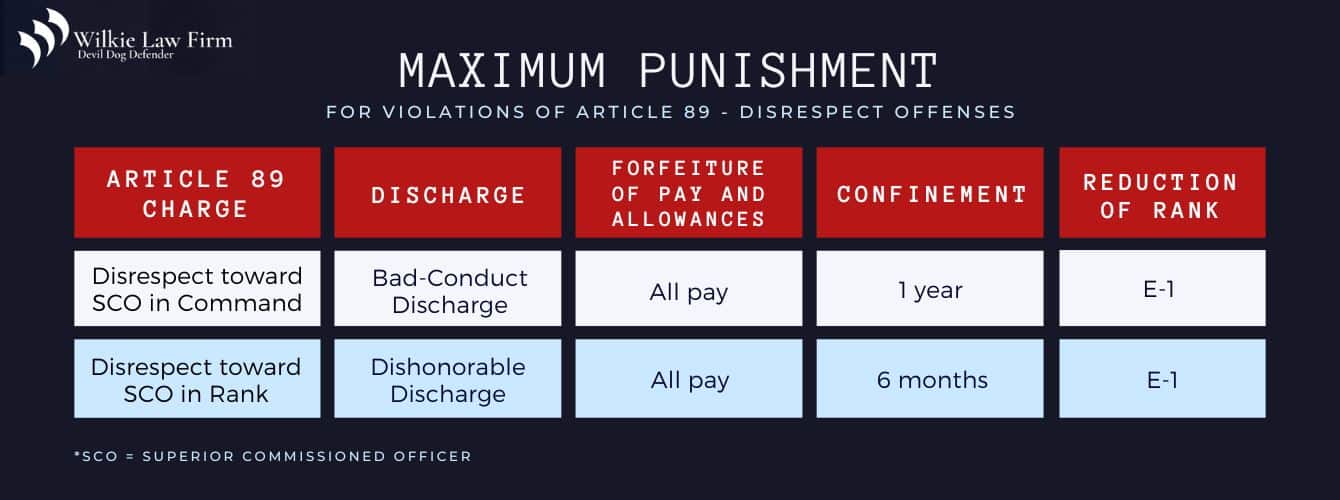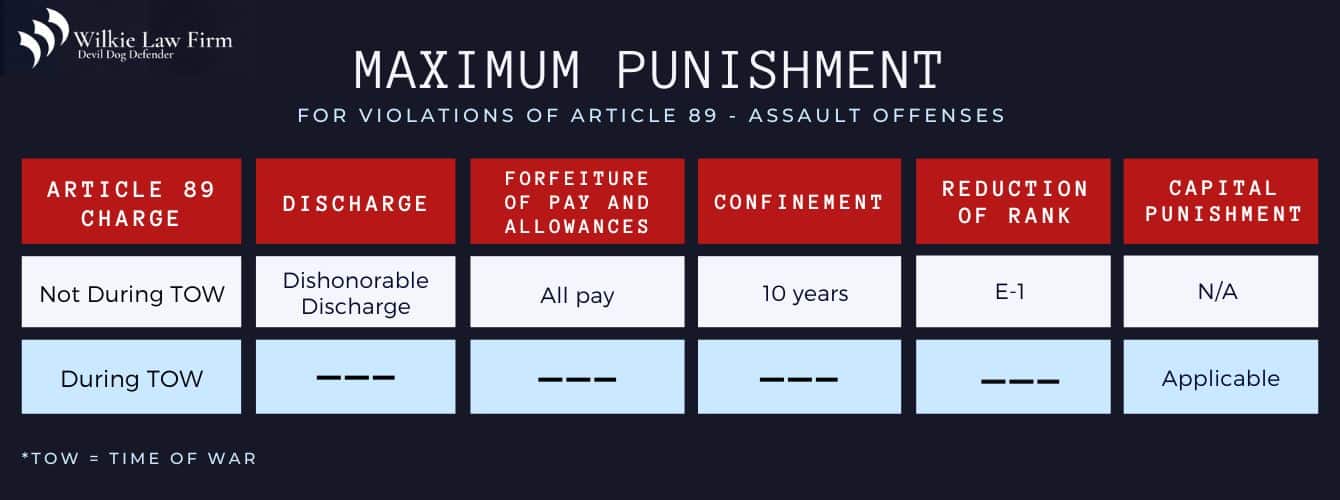Article 89 UCMJ
Military Defense Lawyer for UCMJ Art. 89 Violations
Home » Article 89 UCMJ
Military Counsel
UCMJ Articles
UCMJ Article 89 – Disrespect/Assault of a Superior Commissioned Officer
Table of Contents
Members of the United States military are governed by a unique set of statutory laws that differ from those governing the rest of civilian society. This code of laws is known as the Uniform Code of Military Justice. Within the UCMJ are articles that highlight different regulations and violations of military law. In the text below, experienced North Carolina military defense attorney Aden Wilkie of the The Wilkie Law Group explains the charges involving disrespect toward a superior commissioned officer and assault of a superior commissioned officer as they are defined in Article 89 of the UCMJ.
What is Article 89 of the UCMJ?
Article 89 of the Uniform Code of Military Justice covers disrespect offenses. More specifically, it entails disrespect toward a superior commissioned officer and the assault of a superior commissioned officer. The exact text, as found in 10 U.S.C. 889 – Art. 89, is as follows:
(a) DISRESPECT. – Any person subject to this chapter who behaves with disrespect toward that person’s superior commissioned officer shall be punished as a court-martial may direct.
(b) ASSAULT. – Any person subject to this chapter who strikes that person’s superior commissioned officer or draws or lifts up any weapon or offers any violence against that officer while the officer is in the execution of the officer’s office shall be punished–
- If the offense is committed in time of war, by death or such other punishment as a court-martial may direct; and
- If the offense is committed at any other time, by such punishment, other than death, as a court-martial may direct.
What is a Superior Commissioned Officer?
One of the essential factors of an Article 107 violation is the alleged victim’s status; the offense must be committed toward a superior commissioned officer. Under 10 U.S.C. 801(5), a superior commissioned officer is defined as any commissioned officer superior in rank or command to the accused. This includes commissioned warrant officers, as well.
Further, the statute divides the offense into two groups depending on whether the victim disrespected is a superior officer in the same armed force as the accused or in a different branch.
In the Same Armed Force
The victim is considered superior when they are a commissioned officer who is:
- Superior in rank to the accused;
- Superior in command to the accused (even if they are subordinate in rank status);
- Superior in grade but inferior in command.
In Different Armed Force
The victim is considered superior when they are a commissioned officer who is:
- Superior in chain of command over the accused;
- Senior in grade to the accused and both are detained by a hostile entity so that recourse through the normal chain of command is prevented (though not including a medical officer or chaplain).
What is Considered a Disrespect Offense in the Military?
The primary purpose of the UCMJ articles is to maintain morale, good order, and discipline within the armed forces. As such, disrespectful behavior is strongly prohibited. As defined in the Manual for Courts-Martial, disrespect is considered to be any behavior that detracts from the respect of the authority of a commissioned officer superior to the accused. This includes behavior, language, actions, or omissions of actions.
Examples of specific disrespectful behavior include:
- Abusive epithets
- Insulting or discriminatory language
- Racial slurs
- Derogatory or sexist comments
- Name-calling, taunting, mocking, etc.
- Showing marked disdain
- Indifference
- Insolence
- Impertinence
- Undue familiarity
- Rudeness
- Neglecting the customary salute
What is Considered Assault of a Superior Commissioned Officer?
Included in Article 89 is the offense of “striking or assaulting a superior commissioned officer.” The MCM defines the term “strikes” as being an intentional contact that involves any offensive touching of the officer’s person, however minimal that may be. This offense also includes drawing or lifting a weapon at a superior commissioned officer in a threatening manner. This could be a firearm, whether loaded or not, or any type of object that could be potentially dangerous and brandished as a weapon.
The actual assault of a superior commissioned officer refers to any form of physical assault or battery that is not encompassed by the definitions of “striking” or “drawing or lifting a weapon.” Simply threatening violence is not enough to warrant a conviction under this charge. If the act itself was not executed, it must at least have been attempted.
Elements of UCMJ Article 89 Charge
Disrespect Toward Superior Commissioned Officer
The elements that are required for an Article 89 (Disrespect Toward Superior Commissioned Officers) charge include the following:
- The accused did or omitted certain acts or used certain language to or concerning a certain commissioned officer;
- Such behavior or language was directed toward that officer;
- The officer toward whom the acts, omissions, or words were directed was the accused’s superior commissioned officer;
- The accused knew that the commissioned officer toward whom the acts, omissions, or words were directed was the superior commissioned officer of the accused;
- And under the circumstances, the behavior or language was disrespectful to that commissioned officer.
Striking or Assaulting Superior Commissioned Officer
The elements that are required for an Article 89 (Assault of Superior Commissioned Officers) charge include the following:
- The accused struck, drew, or lifted up a weapon against, or offered violence against, a certain commissioned officer;
- The officer was the superior commissioned officer of the accused;
- The accused then knew that the officer was the accused’s superior commissioned officer;
- And the superior commissioned officer was then in the execution of office.
In the case that the offense occurred during a time of war, that fact will also be included as an element for this charge.
What is the Maximum Punishment for Article 89 Violation?
The maximum punishment for disrespecting a superior commissioned officer and assaulting a superior commissioned officer are as follows:
Disrespect Offenses
Toward Superior Commissioned Officer in Command – Bad-conduct discharge, forfeiture of all pay and allowances, and confinement for up to 1 year.
Toward Superior Commissioned Officer in Rank – Bad-conduct discharge, forfeiture of all pay and allowances, and 6 months confinement.
Assault Offenses
During Time of War – Death or such other punishment as directed by a court-martial.
Any Other Time – Dishonorable discharge, forfeiture of all pay and allowances, and up to 10 years confinement.
Defenses Against Article 89 UCMJ Charge
As listed in the Military Judges Benchbook, one special defense for allegedly disrespectful acts or assaults toward a superior commissioned officer is divestiture. This means that any misconduct on the part of the superior, of which is a substantial departure from the military standards of conduct, refutes their protected status under Article 89. For instance, a superior commissioned officer who initiated an attack on a subordinate divests his or her authority to their protected status. If a victim divested such authority, the accused service member should not be found guilty of an Article 89 violation.
Other defenses include questioning the precise relationship between the victim and the accused, the alleged “disrespect,” and whether the accused knew of the superior rank of the victim at the time. For example, if the accused service member was under the influence of alcohol or other substances at the time of the offense, this might serve as circumstantial evidence that they were not in the right mental capacity to distinguish the superior commissioned officer from other noncommissioned officers or service members.
When you seek the help of a Jacksonville criminal defense attorney from The Wilkie Law Group, your attorney will craft a strategic defense in order to create reasonable doubt surrounding your case and avoid the maximum punishments for your specific offense.
North Carolina Military Defense Attorney for UCMJ Article 89 Violations
If you are facing charges of disrespect toward a superior officer or assault of a superior officer, it is imperative that you obtain the help of experienced civilian-military defense counsel as soon as possible. When you have someone like Aden Wilkie on your side from the very beginning, you ensure that the charges against you are fought aggressively and your rights are protected vigorously throughout the entire duration of your case.
In addition to creating a strong legal defense and protecting your rights and future, Aden is also happy to provide military record-correcting services as well as military discharge upgrade counsel. Located in Jacksonville, NC, Aden Wilkie services the armed forces at Camp Lejeune and Fort Bragg as well as other bases, camps, stations, and posts across the United States. Call 910-333-9626 today for a consultation or complete our online intake form to learn more.
Contact an Article 89 Counseling Attorney
It is vital to use the knowledge of a seasoned attorney to organize and prioritize the material to present to the command. Call The Wilkie Law Group at 910-333-9626 to arrange your consultation.






